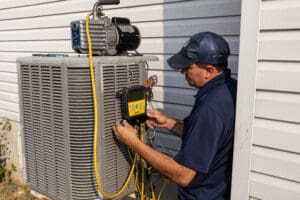Just How to Improve Power Performance With Your Cooling And Heating System and Heating System Upgrades
As energy expenses proceed to increase, the value of improving energy performance with Cooling and heating system and furnace upgrades can not be overstated. Examining your present system's performance and taking into consideration energy-efficient alternatives are essential initial steps.
Examine Your Existing System
Before embarking on any upgrades, it is essential to evaluate your present cooling and heating system and furnace to comprehend their performance and efficiency. This preliminary assessment gives a structure for identifying areas that call for improvement and informs decisions regarding potential upgrades. Begin by taking a look at the age of your a/c system, as obsolete designs may do not have contemporary energy-saving features.

Energy usage documents will certainly also contribute in evaluating your system's operational prices. By assessing utility costs, you can establish patterns of power use and identify spikes that necessitate additional investigation. Lastly, consider conducting a specialist energy audit to get a specialist evaluation of your system's performance. This comprehensive evaluation will assist you in making educated selections around necessary upgrades, making sure that your investments in power performance yield the preferred advantages.
Upgrade to Energy-Efficient Designs
Upgrading to energy-efficient versions is a crucial action in improving the general performance of your cooling and heating system and furnace. These modern-day units are designed to eat less energy while delivering optimal home heating and cooling, resulting in substantial expense savings on utility expenses and a lowered environmental impact.
When considering an upgrade, try to find versions that have high Seasonal Energy Effectiveness Ratios (SEER) for a/c and Annual Fuel Use Performance (AFUE) ratings for heating systems. These rankings show the efficiency of the units, with greater numbers reflecting better efficiency. Energy-efficient models typically incorporate advanced technologies, such as variable-speed electric motors and smart thermostats, which further boost energy financial savings.
Additionally, numerous energy-efficient HVAC systems are outfitted with boosted insulation and far better securing, which minimize energy loss and improve indoor convenience. hvac. While the preliminary investment might be higher, the lasting savings on power prices and potential tax incentives for using energy-efficient appliances can offset this expense substantially

Eventually, upgrading to energy-efficient versions not just contributes to an extra sustainable future however additionally raises the comfort and effectiveness of your home or company.
Optimize System Settings
To optimize the performance of your Heating and cooling system and heating system, it is vital to enhance system settings customized to your specific demands. Begin by setting your thermostat to an energy-efficient temperature.
Use programmable or smart thermostats that enable you to schedule temperature changes instantly. This ensures your system operates only Check Out Your URL when necessary, decreasing power consumption. Additionally, ensure that your system is readied to run in the correct setting-- heating in wintertime and air conditioning in summertime-- while preventing the continual follower choice unless required for air blood circulation.
Frequently review and change setups based upon seasonal adjustments, occupancy patterns, and details convenience choices. Also, make certain that vents and registers are unblocked, enabling optimum air flow. Think about zoning systems that make it possible for customized convenience in various locations of your home, better enhancing efficiency. By fine-tuning these settings, you can achieve significant energy cost savings while keeping a comfortable living environment.
Improve Insulation and Sealing
A well-insulated home is key to taking full advantage of the performance of your a/c system and heating system. Appropriate insulation reduces the workload on these systems, consequently conserving energy and reducing utility expenses. Begin by analyzing your home's insulation in locations such as the attic, walls, and floorings. Insulation materials like fiberglass, foam, and cellulose can considerably improve thermal resistance, aiding to maintain conditioned air inside and outside air out.
Along with insulation, securing voids and cracks is essential. Pay unique interest to home windows, doors, this hyperlink and any penetrations in wall surfaces, such as electric outlets and plumbing components. Weatherstripping and caulking can efficiently secure these openings, preventing drafts that endanger your cooling and heating efficiency.
Additionally, guarantee that air ducts are properly insulated and sealed. Dripping ducts can lead to considerable power losses, reducing system efficiency. Using mastic sealant or metal tape to secure duct joints can boost air flow and efficiency.
Schedule Routine Maintenance
Regular upkeep of your cooling and heating system and heating system is necessary for guaranteeing optimal performance and durability. Arranged inspections and servicing can determine prospective issues prior to they rise, avoiding costly fixings and inefficiencies. During upkeep, a certified technician will certainly clean and replace filters, check cooling agent levels, check ductwork for leakages, and examine total system procedure. This positive method not only boosts energy performance however also extends the life-span of your devices.
It is recommended to arrange upkeep at the very least two times a year-- once in the spring for the air conditioning system and as soon as in the autumn for the home heating system. furnace repair. Routine maintenance aids preserve regular indoor temperature levels, additional reading making certain convenience throughout the year. Furthermore, a properly maintained system runs more efficiently, which can lead to noticeable reductions in power expenses
Ignoring upkeep can lead to decreased performance, increased deterioration, and eventually, system failing. By focusing on normal service, house owners can stay clear of unanticipated breakdowns and guarantee their cooling and heating system and furnace operate at peak performance. Buying upkeep is an important action in boosting energy performance and developing a much more sustainable home atmosphere.
Conclusion
In conclusion, improving energy performance within HVAC systems and heater upgrades is vital for reducing energy usage and improving general comfort. A methodical technique that includes evaluating the existing system, purchasing energy-efficient designs, enhancing settings, boosting insulation, and scheduling normal maintenance can result in substantial benefits. Executing these strategies not only reduces power bills however also adds to an extra sustainable environment, making it necessary for house owners to focus on these upgrades.